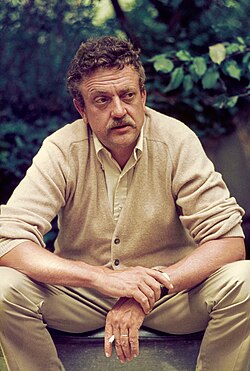Kurt Vonnegut Quote
American humorist Kin Hubbard said , It ain't no disgrace to be poor, but it might as well be. The meanest eating or drinking establishment, owned by a man who is himself poor, is very likely to have a sign on its wall asking this cruel question: If you're so smart, why ain't you rich? Americans, like human beings everywhere, believe many things that are obviously untrue... Their most destructive untruth is that it is very easy for any American to make money. They will not acknowledge how in fact hard money is to come by, and, therefore, those who have no money blame and blame and blame themselves. This inward blame has been a treasure for the rich and powerful, who have had to do less for their poor, publicly and privately, than any other ruling class since, say, Napoleonic times.Many novelties have come from America. The most startling of these, a thing without precedent is a mass of undignified poor. They do not love one another because they do not love themselves.
American humorist Kin Hubbard said , It ain't no disgrace to be poor, but it might as well be. The meanest eating or drinking establishment, owned by a man who is himself poor, is very likely to have a sign on its wall asking this cruel question: If you're so smart, why ain't you rich? Americans, like human beings everywhere, believe many things that are obviously untrue... Their most destructive untruth is that it is very easy for any American to make money. They will not acknowledge how in fact hard money is to come by, and, therefore, those who have no money blame and blame and blame themselves. This inward blame has been a treasure for the rich and powerful, who have had to do less for their poor, publicly and privately, than any other ruling class since, say, Napoleonic times.Many novelties have come from America. The most startling of these, a thing without precedent is a mass of undignified poor. They do not love one another because they do not love themselves.
Related Quotes
Let my silence grow with noise as pregnant mothers grow with life. Let my silence permeate these walls as sunlight permeates a home. Let the silence rise from unwatered graves and craters left by bomb...
It is as difficult for most poor people to truly believe that they could someday escape poverty as it is for most wealthy people to truly believe that their wealth could someday escape them.
About Kurt Vonnegut
Born and raised in Indianapolis, Vonnegut attended Cornell University, but withdrew in January 1943 and enlisted in the U.S. Army. As part of his training, he studied mechanical engineering at the Carnegie Institute of Technology and the University of Tennessee. He was then deployed to Europe to fight in World War II and was captured by the Germans during the Battle of the Bulge. He was interned in Dresden, where he survived the Allied bombing of the city in a meat locker of the slaughterhouse where he was imprisoned. After the war, he married Jane Marie Cox. He and his wife both attended the University of Chicago while he worked as a night reporter for the City News Bureau.
Vonnegut published his first novel, Player Piano, in 1952. It received positive reviews yet sold poorly. In the nearly 20 years that followed, several well regarded novels were published, including The Sirens of Titan (1959) and Cat's Cradle (1963), both of which were nominated for the Hugo Award for best science fiction novel of the year. His short-story collection, Welcome to the Monkey House, was published in 1968.
Vonnegut's breakthrough was his commercially and critically successful sixth novel, Slaughterhouse-Five (1969). Its anti-war sentiment resonated with its readers amid the Vietnam War, and its reviews were generally positive. It rose to the top of The New York Times Best Seller list and made Vonnegut famous. Later in his career, Vonnegut published autobiographical essays and short-story collections such as Fates Worse Than Death (1991) and A Man Without a Country (2005). He has been hailed for his darkly humorous commentary on American society. His son Mark published a compilation of his work, Armageddon in Retrospect, in 2008. In 2017, Seven Stories Press published Complete Stories, a collection of Vonnegut's short fiction.
